Fourth-year couple George and Sara Lin reflect on their time at Vanderbilt University School of Medicine as they look forward to residency and their life ahead
By: Lexie Little
In January 2016, George Lin sat at a table near the entrance of an academic building. He checked the time, which seemed to move slowly. Students funneled into the chemistry lecture hall at Princeton University. Still, he waited, his backpack and books still on the table. Then, there she was.
Tiger tennis player Sara Goodwin pulled up to the building on her pink bike. George packed up his books, timing his turn toward the classroom to coincide with her entrance.
What serendipity. They had chemistry.
“Did you see the Kansas basketball game last night? I think they will win the Big 12 this year!” George said as they walked into class. He always arrived early, somewhat clumsily, to get the seat next to Sara. And, gregarious by nature, he always found something to say.
She smiled, struck by his goofy sense of humor, which she shares.
“I think they are well on their way to their 11th straight,” she said.
This pattern continued until March. During spring break, Sara swore to her mother George wasn’t interested. When they returned to campus, George finally asked her on a date to PJ’s Pancakes.
Sara Lin remembers that time fondly.
Beginning a new journey together
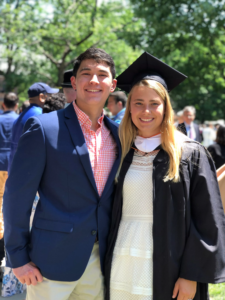 Now fourth-year medical students at Vanderbilt University School of Medicine, George and Sara prepare for more important March dates together. The couple, married since June 2019, will find out where and how their relationship and careers will continue on residency Match Day next month. Specializing in ophthalmology and emergency medicine, respectively, George early matched on Feb. 1, and Sara will learn her of her residency match on March 17.
Now fourth-year medical students at Vanderbilt University School of Medicine, George and Sara prepare for more important March dates together. The couple, married since June 2019, will find out where and how their relationship and careers will continue on residency Match Day next month. Specializing in ophthalmology and emergency medicine, respectively, George early matched on Feb. 1, and Sara will learn her of her residency match on March 17.
“Compared to medical school admissions, residency programs are more prepared to acknowledge that some people might have spouses and partners in medicine,” George said.
The duo has navigated difficult decisions before. Sara entered Princeton a year before George. They both wanted to pursue careers as physicians, and they realized around 18 months into their relationship that they felt strongly about building a life together.
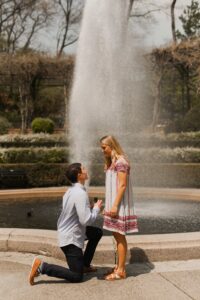 Sara’s tennis and academic schedules left little time to apply to medical schools, and she decided to take a gap year to find a medical school with George in anticipation of getting engaged. He quickly confirmed those suspicions when he grew increasingly (and uncharacteristically) quiet on a trip to New York City. He proposed in the same place her parents got engaged 29 years prior, The Conservatory Gardens in Central Park, on April 28, 2018.
Sara’s tennis and academic schedules left little time to apply to medical schools, and she decided to take a gap year to find a medical school with George in anticipation of getting engaged. He quickly confirmed those suspicions when he grew increasingly (and uncharacteristically) quiet on a trip to New York City. He proposed in the same place her parents got engaged 29 years prior, The Conservatory Gardens in Central Park, on April 28, 2018.
Wedding planning coincided with medical school planning.
“We were lucky enough to both get into a few schools, and we both liked Vanderbilt a lot,” Sara said. “George actually got into Vanderbilt before I did, so when he told them, ‘Oh, my fiancée’s also applying,’ the admissions office was immediately supportive. We felt like it would be a great place to be.”
The Lins considered program responses to their relationship status as a litmus test for potential success. They felt Vanderbilt acknowledged both their individual characteristics and the importance of their relationship as part of their identities.
“I probably still have the email saved in my inbox – the message from Jenn Kimble saying something like, ‘Oh, this is so sweet. We love couples. Thank you so much for sharing this and letting us know,’” George said. “Sara wasn’t in at that point, but we knew this would be a great fit because there was already someone who was really supportive of the two of us. All of the deans, the administration, they were so supportive. I think the first year, they intentionally tried to separate us so we could find our own footing in school. We were never in any small groups together, and that’s pretty hard to do because we have so many different random samplings for coursework like case-based learning groups, for example.”
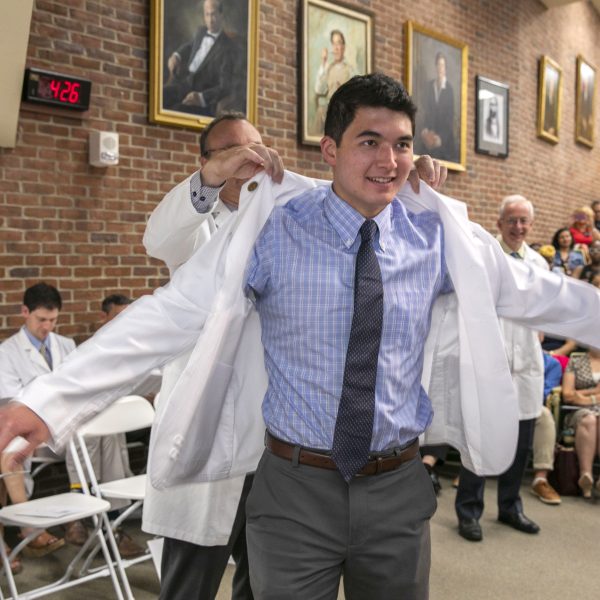
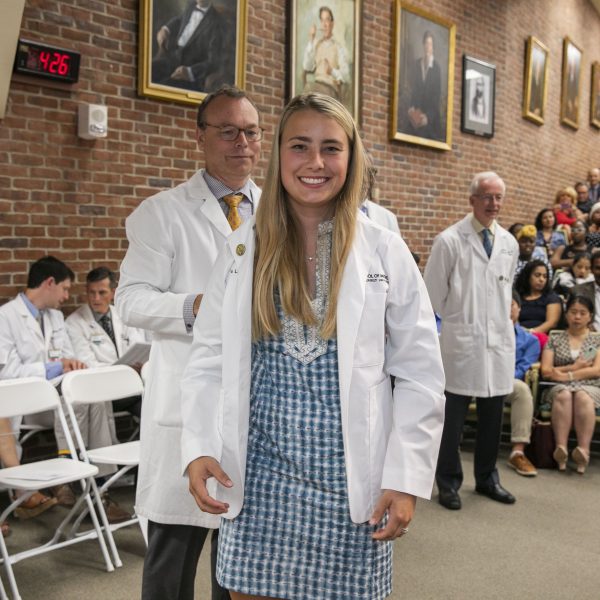
Yet, their first year at VUSM brought them closer together than ever, literally. The COVID-19 pandemic had forced some coursework online, and as first-year students, the same material (and same walls) surrounded them.
They woke up. Ate the same breakfast. Attended the same Zoom lecture. Broke off into different small group Zoom sessions. Sitting in their 600-sq. ft. apartment, Sara could hear George through the wall.
“I was basically screaming and yelling during our small group because I don’t have an inside voice,” he said, laughing. “She could hear everything I was saying…We had nothing to talk about because we knew exactly what happened to each other all day.”
Thankfully, the subsequent years provided ample opportunity to develop individual interests in medicine.
Finding their own paths
Sara always moves with a sense of urgency. One day, rushing toward the hospital doors, she knew she needed to find George when he arrived. She looked down at the badge and lanyard swinging from her neck as she moved quickly through the parking lot. She spotted him as he walked to meet her. Detail-oriented, he couldn’t help but to also notice the badge he wore and the name at the top: Sara Lin.
They laughed, exchanging their identical lanyards with obviously disparate badges.
“I had picked up George’s badge, and he was wearing mine,” Sara said. “Being able to meet up in the hospital to give each other what we forgot is definitely nice. We’ve left laptops and things at home before.”
While they find a great sense of understanding for each other, like knowing what the other might be feeling on a day they lose a patient or understanding terminology in medicine, they appreciate their differences (including those that help them avoid future badge mix-ups).
George enjoys detail, learning the most about the most granular subjects in medicine and finding solutions to problems. He used this introspective knowledge to inform his specialty decision.
“There’s all sorts of decision points when you’re picking a specialty,” he said. “Do you like medicine? Do you like surgery? Do you like being more of a generalist, or do you only want to focus from the neck up? I feel like I have always been someone who is drawn more to the detail-oriented side of medicine. I don’t like not having answers, so my MO is being the person who knows the most about one little sliver.
“I started volunteering with Shade Tree [student-run free clinic] in the ophthalmology clinic and really loved it. I had some friends who got me plugged in through there, and it all went from there. The department was so supportive, and they were like, ‘Oh, come do research with us, come shadow.’ I knew I wanted to be a specialist, but that’s how I came to ophthalmology.”
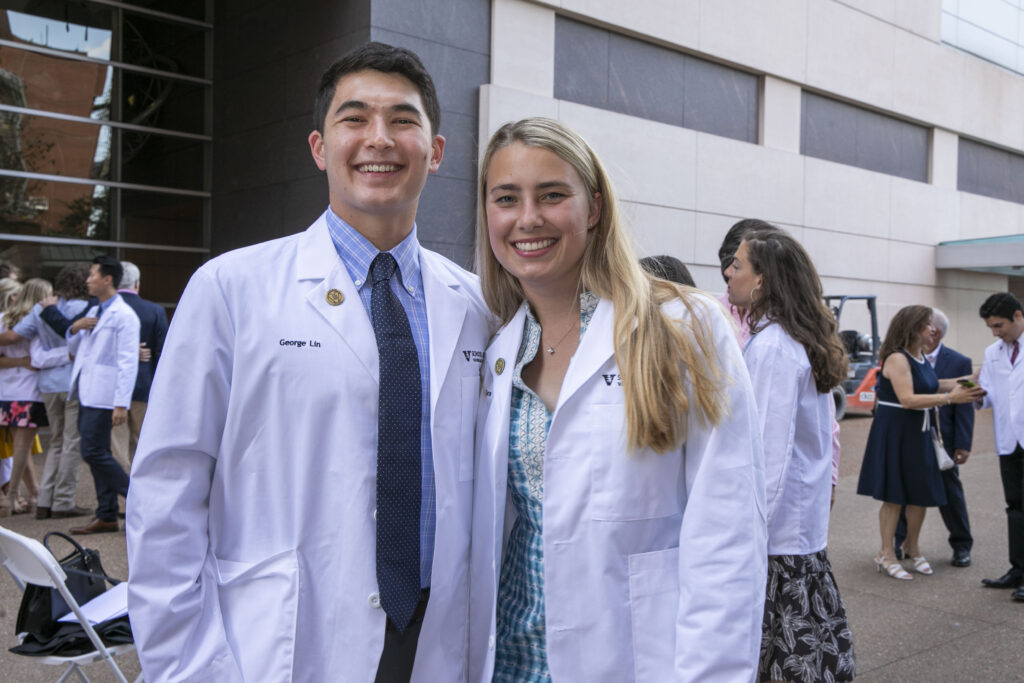
While George found mentors at Vanderbilt Eye Institute in part thanks to older classmates who recognized his passion and potential, Sara viewed her specialty decision as more of a puzzle – a broad picture decision with many questions.
Second year, she found herself declaring interest a new specialty every week, primarily because she found great joy in being on the wards after a pandemic year spent largely removed from the hospital campus.
“Every rotation, I thought, ‘Oh, maybe I’ll do this,’ just because I enjoyed being in the clinical environment of medicine,” she said. “In my third year, I thought I might want to do emergency medicine, but I hadn’t done a rotation. I said, ‘Well, I think this is what I want to do,’ because I have always been drawn to the patient where no one knows what is really going on, and you have to figure out the first few steps. That’s what really got me interested in emergency medicine. I felt similarly welcomed by the department. I did my research immersion in the emergency medicine department, and I really have not had one bad experience in the emergency department here.”
George knew Sara’s specialty before she did. After a late shadowing session in the emergency department during their first year, she came bursting through the front door, energized. At 10 p.m., George – acutely aware of eyes – felt his drooping.
“I am so excited,” Sara said. “That was so great. I saw all of these cool cases. Let me tell you about it.”
He tried to listen as he nodded off. Nevertheless, they finally found something to talk about.
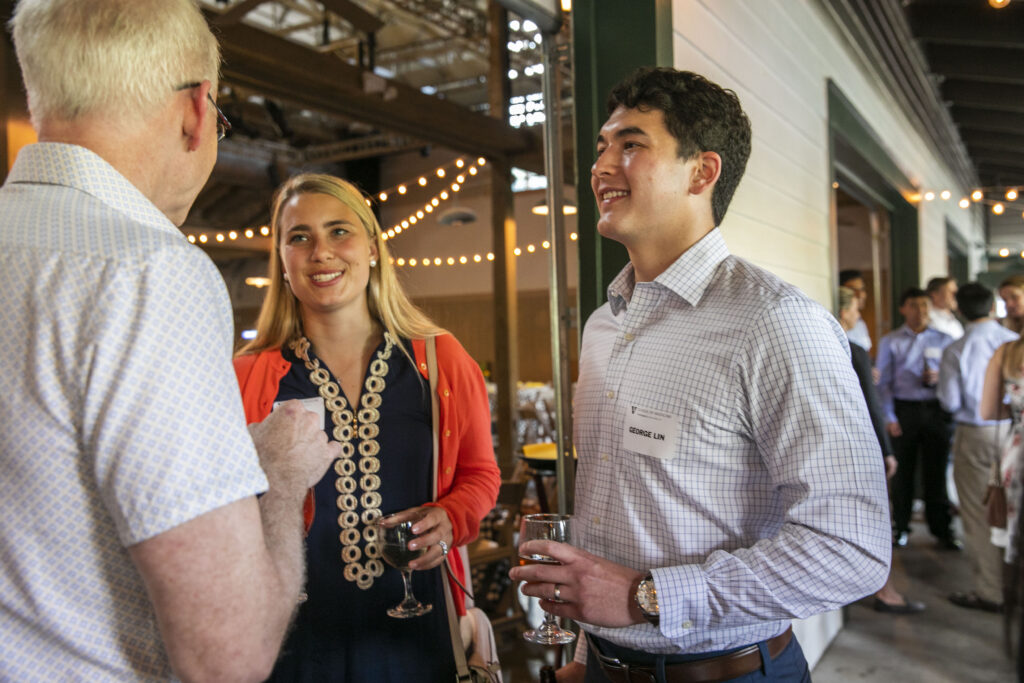
Learning and leading at VUSM
While the Lins admit George is the more talkative of the two, Sara finds herself speaking more and more publicly, especially about issues concerning the MD student body. She currently serves as executive president for the MD Council of Class Officers, which acts as the student government of the medical student body. CCO leaders take concerns and questions to VUSM leaders and administrators to collaborate on innovative solutions regarding the curriculum, wellness, and more.
When the previous Class of 2023 President Mason Alford decided to earn his MBA through the dual degree pathway, students needed a new representative.
“He said, ‘Hey, is there any way you’d be interested in this? I think you’d be great,’” Sara said. “I had run for office once in the past, so I said, ‘Sure, I’ll do it.’ We actually have [three class representatives] who were all new, which I guess it’s rare that fourth year turns over…It’s been a good kind of work because I really enjoy talking to younger students, knowing what’s on their minds, and hearing about challenges. A few months ago, the M1s were feeling especially stressed, and we brainstormed what we could do as a student body to support them. Working with MSA, they’re great at helping to coordinate everything. It reminds me of playing tennis again because it really is like a team sport. You have the administration, MSA, and all of the different class reps. It’s been a good experience.”
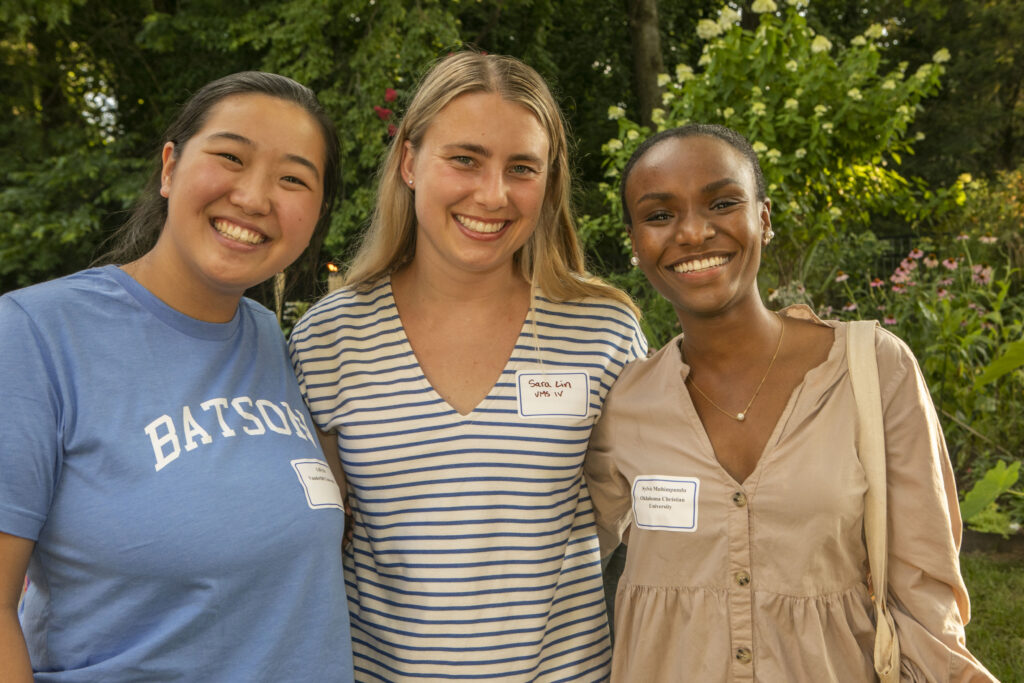
George embraces his status as “First Man.” He tags along for what he calls the fancy dinners with members of the Vanderbilt medical community. But more importantly, he supports his wife in her growth.
“It’s been fun for me to watch Sara flourish as a leader, and I am really proud to watch her thrive,” he said. “Third-year students will say, ‘Oh, you’re Sara’s husband!’ And that’s how I want to be identified – definitely not as the guy who spams the email listserv with ophthalmology emails.”
He finds important work of his own through volunteering at Siloam Health, where he completed his M1 continuity clinic. First-year students spend one half day per week in an assigned clinic to learn more about health care delivery. Siloam serves many immigrant and refugee patients, groups in which George had great interest.
At Princeton, he volunteered to aid in refugee resettlement. He looked forward to helping them clinically.
“Siloam really inspired me,” he said. “There was just something special about getting the chance to work through Siloam because they really understand the barriers to care and understand how to provide really effective, compassionate, safe, high quality cross-cultural care, which is so hard to do. Each one of those adjectives is a hard thing to achieve. Then, during clerkship year, I worked a lot with Shade Tree and the ophthalmology clinic, going monthly to volunteer there. I really enjoyed it…I was excited to get there and look at eyeballs and see the optic nerve. I was so glad to help patients and reassure them they weren’t going blind. Many just had dry eyes, and I knew they were painful, but I could assure them they were okay and provide necessary care.
“I got to go back to Siloam for my primary care rotation in fourth year. It was cool to go back and come full circle. I barely knew how to listen to a heart my first year, and now I’m seeing patients more on my own and presenting to the attending. I feel like I’m stepping into that role of giving compassionate care. So that was all really exciting. I got to teach a little bit about the eyes in primary care and gave a chalk talk at the end. We were able to partner and see some of the eye patients from Siloam at Shade Tree, and they could get referred on to Vanderbilt Eye Institute… I feel so privileged to have this experience and take a better understanding of some of these issues with me.”
Preparing for continued training together
As they prepare to advance to residency, Sara and George reflect on their journeys at VUSM, both those they took as individuals and their life as a couple.
“There are of different places, and they all have their strengths, but we wanted to be somewhere where they looked out for the both of us,” George said. “I feel like everybody was on the same page to make success for the both of us. [Our mentors, deans, and staff] focused on what’s best for the both of us together.”
As members of two different advisory colleges, smaller groups of MD students across years, the Lins doubled their number of mentors through their connections. Two faculty mentors lead each of four colleges, providing support as students build community and learn from each other.

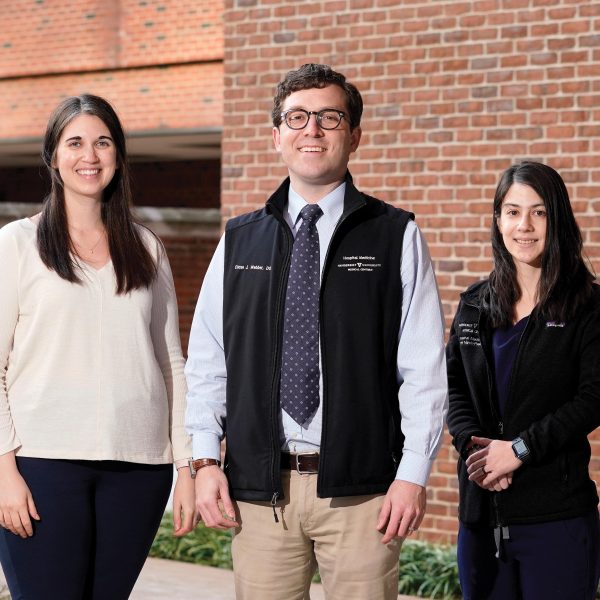
George entered Chapman College when Dr. Beth Ann Yakes, associate professor of medicine, served as a longtime mentor.
“We both really got along with her and had a few meetings with her,” Sara said. “We both love the college system in general and having those connections to attendings, even if they’re not in your own field, to bounce questions off of them.”
“I shadowed in anesthesia for a bit, and Dr. Pilla was Sara’s college mentor” George said. “We knew each other. I feel like the college system was really good for us because I feel like it doubled our mentors. Maybe Sara was thinking about the challenges of being a woman in medicine. Both of the Robinson mentors before this year were men, but Sara could come to my college mentor. Sara knew Dr. Yakes through me and felt comfortable going to her.”
Now entering the final month of the residency Match process, they again turn to shared mentors who advise them both.
Sara appreciates the support they receive as they navigate their next move, one that hopefully keeps them as close as possible.
“Vanderbilt is so supportive,” she said. “Even the program directors of the specialties we want to go into are very invested in us and want us to succeed, and be happy, and be together. They understand our unique situation and have advised us throughout the process.”
Portfolio coaches on the MD faculty also helped to guide both students. Dr. Reid Longmuir, neuro-ophthalmology division chief, initially worked with Sara as her portfolio coach. Portfolio coaches work with students to foster self-assessment and development as they progress in medical school.
Longmuir did not realize he would gain two mentees in working with Sara, but he is confident in their preparedness and looks forward to supporting their careers.
“Sara has been working with me in the portfolio coaching program from the beginning,” he said. “She mentioned George in passing, but I didn’t think much of it at the time. Fast forward to third year, and here is George interested in ophthalmology. I felt a moment of anxiety, as I am always nervous about couples matches, and I had never been in a position of separately mentoring both partners in a couples match. Then I saw George work in clinic, and I knew this would be the exception. They are each incredibly well-prepared for any possible outcome. I really hope I get to stay involved with their careers moving forward.”
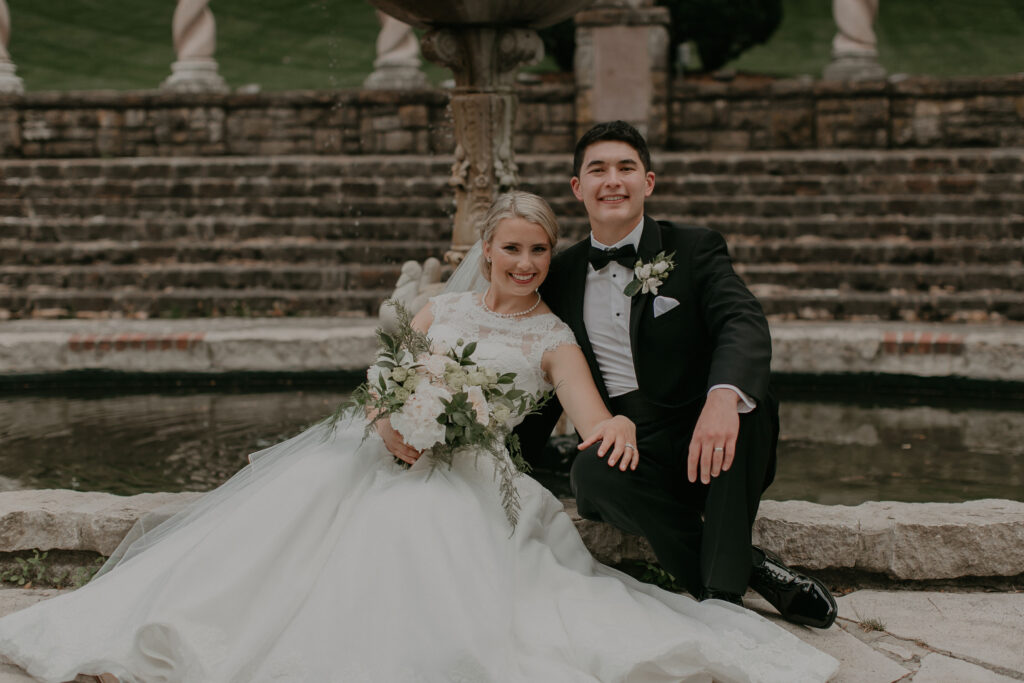
As their four years at VUSM end, George still intentionally waits on Sara to pull up to the building – only this time to go home.
And no matter where their careers take them, they will always consider Vanderbilt a home.
“Vanderbilt has been everything we ever could have dreamed of in coming to medical school,” George said. “We were talking about this, and if we could pick anywhere to go for medical school and line it all up, we would come here again and again and again just because of the support and the community. With the environment and the mentors, it’s been a great four years.”